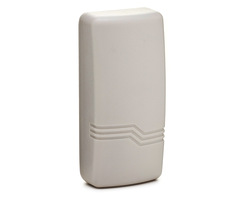Why One-Go-All-Go Smoke Detectors are Perfect for Your Home
Posted By Michael GorisHi DIYers! Today, we're taking a look at why one-go-all-go smoke detectors can help ensure that everyone in the building is alerted during a fire. Simply put, a one-go-all-go smoke detector will cause all of the other compatible smoke detectors on the system to activate at the same time.

Having all the smokes in your home activate at the same time can be crucial for ensuring that everyone is alerted in the event of a fire. This is especially true for larger homes that need several smoke detectors for complete coverage. Most alarm systems can have some type of interconnected one-go-all-go smoke detector network. However, implementing this feature properly can be difficult, and it requires additional equipment and wiring. Another important thing to remember is that the one-go-all-go feature is best achieved by using the same detector model across the network.
For those with wired alarm control panels, there is often a way to achieve a one-go-all-go setup using hardwired smokes. This is possible with both 2-wire smokes and 4-wire smokes, but both require the proper equipment. Many wired panels offer a way to conveniently reset the zone used for 2-wire smokes after a fire alarm has been cleared. This is needed for getting the smoke detectors to stop sounding and to reset the detector so that it can trip again, if necessary.
For the Honeywell VISTA Panels, all 2-wire smokes must go on zone 1. This zone will automatically reset, and power will be briefly dropped to the smokes after the alarm is cleared. Multiple 2-wire smokes are wired together in parallel, with an end of line resistor (EOLR) for wiring supervision. A good 2-wire smoke detector to use is the System Sensor 2WTA-B, which also includes a built-in sounder.

Unlike 2-wire smokes, 4-wire smokes have less restriction regarding where they can be wired. In fact, a 4-wire smoke on a Honeywell VISTA System will generally go on any hardwired zone, except for zone 1. Again, the smokes can be configured for a one-go-all-go setup, but this will require additional equipment and wiring. This also allows the smokes to take up fewer systems zones, as they can all use the same zone and programming settings.
One downside to using 4-wire smokes is that they often require additional resources to work properly. In order to get a 4-wire smoke to stop sounding, power to the device must be dropped. But unless the system has a built-in relay, this cannot be done without additional hardware. This can require an external relay, and possibly an additional power supply as well. Proper operation will also require an end-of-line power supervision relay to check whether or not power to the smokes has been interrupted. If you do decide to go the 4-wire route, the System Sensor 4WTA-B is a good option.

More recently, certain wireless smoke detectors also offer one-go-all-go functionality. Honeywell really took the initiative here by making their Lyric SiXSMOKE Sensor a one-go-all-go device. This sensor is exclusively compatible with the Honeywell Lyric Alarm System, and provides a very easy way to achieve a robust one-go-all-go setup. One-go-all-go is also compatible with the new Honeywell SiXCOMBO, which also offers heat and CO detection.

If you have a different wireless system than the Lyric, then there might still be way to attain a one-go-all-go setup. In most cases, this will require using 4-wire smokes with a compatible wireless transmitter. The transmitter will need to be able to support Normally Open (NO) life-safety devices with an end of line resistor. However, this is not possible for every wired-to-wireless converter.
Additionally the standard equipment for any 4-wire smoke is also required. This includes a relay, power supply and resistor. One transmitter that will work for this application is the Honeywell 5817CBXT. This module is part of the Honeywell 5800 Series, and it will work with nearly any alarm system that accepts the 345 MHz wireless frequency. Remember, the transmitter or converter must communicate at a frequency accepted by the alarm control panel.

Additionally, Qolsys recently released the Qolsys IQ Hardwire 16-F for 319.5 MHz systems. This is a 16-zone wired to wireless converter that is great for bringing over hardwired sensors to a newer wireless system. Zone 16 on the module is a Normally Open loop specifically designed for 2-wire smokes. The loop will support up to ten 2-wire smoke devices, which are wired in parallel with an end-of-line resistor. This revolutionary module represents the first way to bring 2-wire smokes over to a wireless all-in-one system. The necessary resistors come included with the module.

Additionally, if you have an existing network of high-voltage smokes, you can integrate them into a wireless system using a takeover module. These are devices that listen for the unique temporal sound of an activated smoke detector. If the existing smoke detector network is one-go-all-go, a single takeover module can accommodate the entire network. Alarm Grid offers takeover modules that operate at the 319.5 MHz (Interlogix/GE and Qolsys), 345 MHz (Honeywell and 2GIG) and 433 MHz (DSC) wireless frequencies. That way, you can conveniently take an exiting high-voltage smoke network and start using it with your new wireless security system!
If you need help choosing smoke detectors for a one-go-all-go setup, please don't hesitate to reach out to us! We can help you determine the perfect fire-protection devices for your security system. You can send an email to support@alarmgrid.com, or you can call us at (888) 818-7728 during our normal business hours of 9am to 8pm EST M-F. We look forward to hearing from you!
